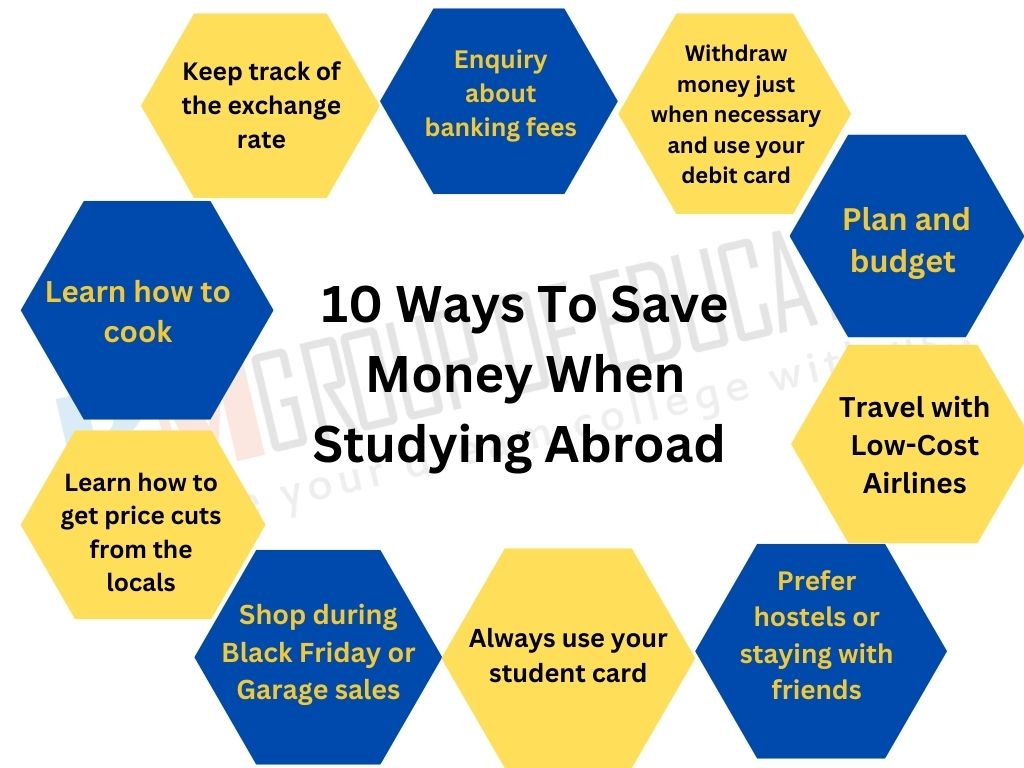10 Tips on How to Save Money for Students While Studying Abroad: Congratulations! You’re heading to study abroad in a great city, jumping through all the paperwork hoops and arriving at a foreign country’s airport with just your suitcase and a heady sense of excitement. What Now? In a few months, you’ll have made new friends and gained invaluable knowledge of a new culture, but you’ll also be broke. Like, totally broke. You’re not sure if you can afford the plane ticket home anymore because you’ve had to pawn everything you own. It’s that bad. The euphoria of going on an exchange to a new country is something everyone should experience, but it can also be one of the most financially stressful times of your life. You want to see everything and do everything, but it’s hard to budget when you’re thinking in a strange currency, and everything is so shiny and new.
Managing finances while studying abroad is crucial. Analyze your living costs, course fees, and visa expenses to plan your budget. Consider factors like exchange rates and ways to reduce expenses. Your ability to manage these aspects will greatly impact the success of your experience abroad. Check out our tips below on how to save money while studying abroad for a stress-free experience. No Donation, No Entrance and MBBS Abroad Under 20 Lakh.
Subscribe to RM Group of Education Newsletter, Get Admission, Fees, Seats etc.
Contents
10 Tips on How to Save Money for Students While Studying Abroad

1. Keep track of the exchange rate
The exchange rate determines how much money you receive when converting your currency to another country’s currency. Before exchanging large sums, especially before your trip and at the beginning of each month, check the current rate. Evaluate whether the rate is favourable and consider if waiting a few days could result in a better exchange rate.
2. Enquiry about banking fees
Before your trip, visit your bank to inquire about all costs related to overseas transactions. These costs can include minimum fees per transaction, commission rates for currency conversion, and fees for using ATMs abroad. Without planning, you could incur significant expenses for each transaction, and multiple transactions per month could take up a large portion of your budget. To avoid this, set a budget that includes the anticipated number of monthly transactions, account for these costs in your budget, and aim to minimize the number of transactions.
3. Withdraw money just when necessary and use your debit card
To manage your finances abroad, minimize ATM visits and use your debit card for purchases, even small ones. When withdrawing cash, aim for one transaction per month to reduce fees. Keep your money secure and consider safety precautions, such as going with friends for large withdrawals. Use money transfers for accommodation, transport, or bills to avoid carrying cash daily. This helps prevent overspending on non-essentials like drinks or shopping and keeps your budget on track.
4. Plan and budget
The easiest way to save money is to plan and stick to a budget. By understanding overseas bank fees and the cost of living at your destination, you can maintain a simple expense diary based on your budget. Additionally, it’s wise to set aside a small fund for unexpected costs in case of accidents or emergencies during your trips. This is one of the key tips from “10 Tips on How to Save Money for Students While Studying Abroad.”
5. Travel with Low-Cost Airlines
Once you have started your course or program, an exciting part of your experience is the opportunity to travel to nearby towns and go sightseeing outside the country. An advantage of large cities worldwide is the number of daily flights and the wide range of low-cost airlines that offer special deals all the time. However, before travelling, we advise you to review in detail other aspects such as excess baggage costs, transportation, fees for additional services for food and fast-boarding, plus do some research about how to get to the airport.
6. Prefer hostels or staying with friends
Hostels are the best choice when it comes to budget, but they are prepared to share with people from different backgrounds and routines; in most cases, you will have to pay for additional services such as internet, toiletries and a still water bathroom for strangers. Be careful with your belongings; use a padlock in your suitcase when you leave the room and do not leave valuable items or cash in the room.
7. Always use your student card
Wherever you go, ask for a student discount. You will be thankfully surprised by the many establishments that offer student discounts and, in some cases, freebies like free tours, city guides and maps. In most cases, you could get a 10-20% discount. Always check the expiry date of your student ID and ask your university or college if they issue a special student discount card.
If, despite your best efforts, you’re still strapped for cash at the end of the month and your study abroad visa prevents you from working in this country, what can you do? Well, an easy way to make some money in exchange is by tutoring, translating or babysitting on the side. If you don’t want to commit to anything drastic, check out the psychology labs at local universities. They’re often looking for participants for studies and will pay you to spend an hour answering a survey or doing some mindless task. A bit of pocket money should keep the wolf at bay for a little longer!
8. Shop during Black Friday or Garage sales
You might be eager to purchase all of your essentials at once when you first arrive at your study abroad location. But we advise you to wait before doing it. It is usually less expensive to purchase items like furniture or other trinkets at garage sales or flea markets as opposed to regular stores. When it comes to the rest of your daily necessities, you can always shop in bulk at places like Costco or Walmart. What is the best choice? Seasonal deals like Black Friday, Boxing Day, Cyber Monday, etc., should be attended. It’s incredibly affordable, and these sales offer unbelievable savings.
9. Learn how to get price cuts from the locals
Your local contacts and friends can be invaluable in helping you keep your study abroad costs low. Locals know how to get discounts on goods and services in their area. They can guide you on where bargaining is effective and where it isn’t. By following their tips and tactics, you can save money on every purchase.
10. Learn how to cook
This is one of the best pieces of advice for students studying abroad. It not only teaches discipline but also helps you make significant financial savings. When you have to prepare every meal yourself, ordering takeout is not the solution. By cooking a few large recipes on the weekends, you can prepare meals for the entire upcoming week at a lower cost than ordering takeout two or three times. Additionally, cooking for yourself allows you to personalize your diet and maintain a healthy lifestyle.
Frequently Asked Questions (FAQs)
How can I travel for less money?
Purchasing a used bike in this situation is an extremely smart move. With a bike, you may save a lot on fuel and maintenance. In addition, you can always go exploring on your own terms!
Can I pay for my own college expenses?
Yes, you can always finance your education on your own via loans, grants, scholarships, or even part-time employment.
How do I save money when studying abroad?
The following are the ways to save money as a student:
>Keep track of the exchange rate
>Enquiry about banking fees
>Withdraw money just when necessary and use your debit card
>Plan and budget
>Travel with Low-Cost Airlines
Can I earn while studying abroad?
Many students opt for working a part-time job while studying abroad as it helps them to earn some funds as well as experience the culture and make connections. Students can work in baristas, restaurants or in college itself.

